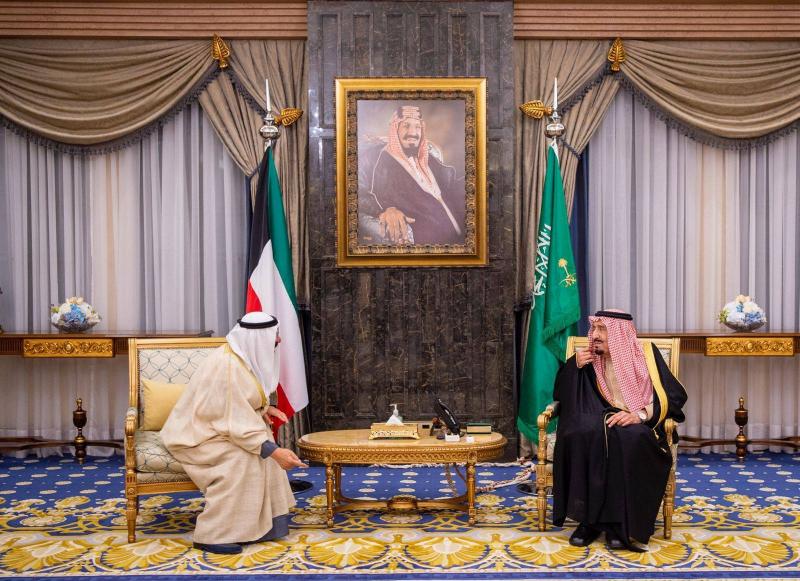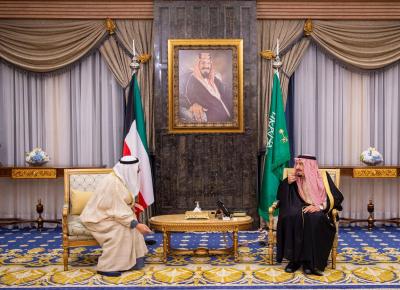A joint Saudi-Kuwaiti statement was issued at the conclusion of the Emir of Kuwait, Sheikh Mishal Al-Ahmad Al-Jaber Al-Sabah's visit to the Kingdom, during which he met with Saudi Crown Prince Mohammed bin Salman. The statement outlined several points regarding the development of relations between the two countries and emphasized that the Durra field is located in Kuwait's maritime areas. Both sides also called on Iraq to "commit to the sovereignty" of Kuwait concerning the "Kuwait Bay."
The statement stressed the importance of Iraq's commitment to the sovereignty of the State of Kuwait, its territorial integrity, respect for agreements and international commitments, and all relevant United Nations resolutions, especially UN Security Council Resolution 833 (1993), which delineated the land and maritime borders between Kuwait and Iraq. It also emphasized the importance of completing the maritime boundary demarcation between the two countries beyond maritime marker 162.
In this regard, both sides urged Iraq to adhere to the maritime navigation agreement in Abu Abdullah signed between Kuwait and Iraq on April 29, 2012, which entered into force on December 5, 2013, after being ratified by both countries and jointly deposited with the UN on December 18, 2013.
The two countries rejected Iraq's unilateral cancellation of the 2008 security exchange protocol and its endorsed map in the joint plan to ensure safe navigation in the Abu Abdullah signed between the two sides on December 28, 2014, both of which included clear and specific mechanisms for amendment and cancellation.
Saudi Arabia and Kuwait reiterated their support for UN Security Council Resolution 2107 (2013), which calls for the Special Representative of the Secretary-General and the Head of the United Nations Assistance Mission for Iraq (UNAMI) to enhance, support, and facilitate efforts related to the search for missing Kuwaitis and third-country nationals and to determine their fate or return their remains through the trilateral committee and its technical subcommittee under the auspices of the International Committee of the Red Cross. They also stressed the importance of continuing to monitor the Security Council regarding the file of missing Kuwaitis and third-country nationals and the file of missing Kuwaiti property, including the national archive.
Regarding the Durra field, the joint statement confirmed that "both sides reaffirmed what was stated in the statement issued on 15/1/1445 AH, which confirmed that the Durra field lies entirely in Kuwait's maritime areas, and the ownership of natural resources in the divided submerged area, including the entire Durra field, is a joint ownership between the Kingdom of Saudi Arabia and the State of Kuwait only, and they alone have full rights to exploit the resources in that area, firmly rejecting any claims of rights by any other party in this field or the divided submerged area."
Saudi Arabia and Kuwait renewed their previous and repeated calls for the Islamic Republic of Iran to negotiate regarding the eastern boundary of the divided submerged area with Saudi Arabia and Kuwait as a single negotiating party, with the Islamic Republic of Iran as another party in accordance with international law.
Concerning the situation in Yemen, Riyadh and Kuwait emphasized "the importance of fully supporting UN and regional efforts to reach a comprehensive political solution to the Yemeni crisis." The Kuwaiti side praised "the Kingdom's efforts and numerous initiatives aimed at encouraging dialogue and reconciliation among Yemeni parties, and the role of both countries in providing humanitarian assistance while facilitating the Kingdom's delivery of that aid to various areas of Yemen."
In a related context, amid the escalation between the US and UK on one side, and the Iranian-backed Houthi group on the other, both sides stressed "the importance of maintaining security and stability in the Red Sea region, respecting maritime navigation rights in accordance with international law and the United Nations Convention on the Law of the Sea of 1982 to safeguard the interests of the entire world," and called for restraint and avoidance of escalation in light of the current events in the region.




